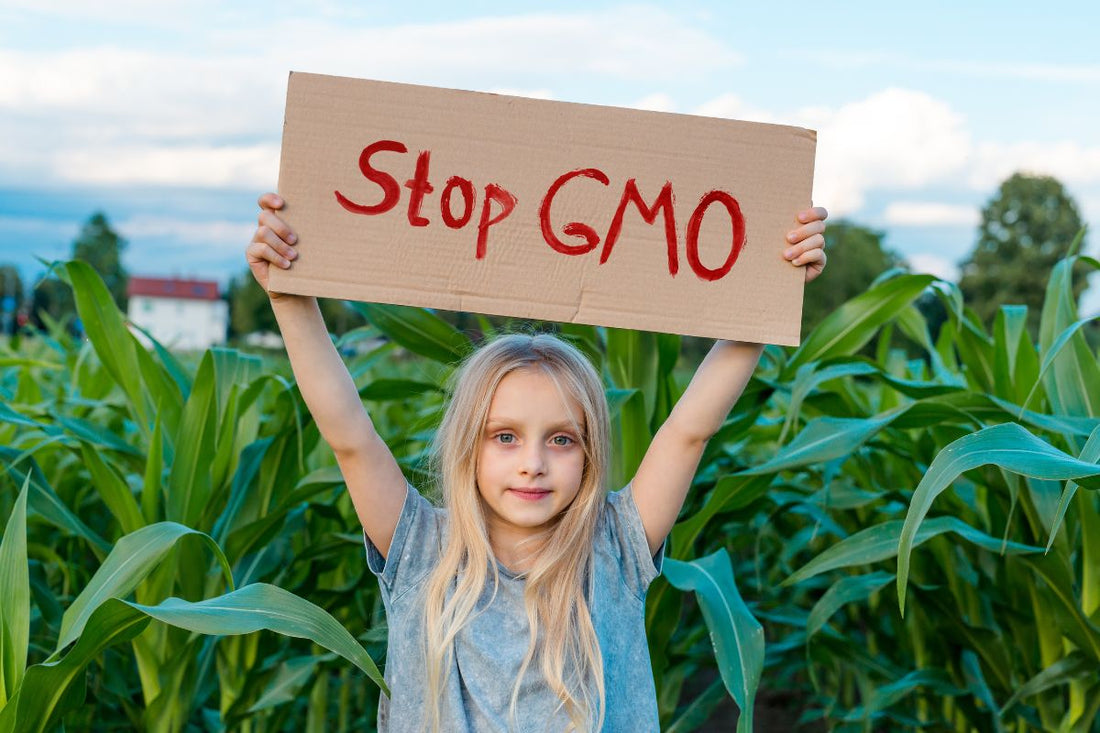Let's be honest, it has never been easier to access information on health and wellness than it is today! People are becoming more health-conscious because the choices we make regarding our food have a significant impact on our well-being. When it comes to making informed decisions about what we eat, opting for GMO-free products is becoming increasingly popular. This article explores why choosing GMO-free is the right choice for your health.
Genetically modified organisms (GMOs) are foods that have been altered in a laboratory to enhance certain traits, such as resistance to pests or the ability to survive harsh growing conditions. However, concerns have been raised about the potential risks associated with consuming GMOs.
By choosing GMO-free products, you are prioritizing your health and reducing the potential risks that GMOs may pose. Many studies have linked genetically modified foods to allergies, reproductive disorders, and even cancer. By opting for GMO-free alternatives, you are avoiding these potential health hazards and choosing a more natural and wholesome option.
Additionally, GMO-free foods are often produced using organic farming practices, which promote environmental sustainability and the health of the ecosystem. This means that not only are you benefiting your health, but you are also supporting a more sustainable and ethical food system.
Make the right choice for your health by choosing GMO-free options. Take control of your well-being and enjoy the peace of mind that comes with knowing you are making the best choices for your body.
What are GMOs and their impact on health?
GMOs, or genetically modified organisms, are foods that have been altered through genetic engineering techniques. This process involves inserting genes from one organism into another to enhance specific traits, such as resistance to pests or the ability to tolerate herbicides. While the intention behind GMOs is to improve crop yields and enhance food production, concerns have been raised about their potential impact on human health.
Studies have shown that consuming GMOs may have adverse effects on our well-being. One major concern is the potential for allergic reactions. The introduction of foreign genes into a plant can create new proteins that may trigger allergies in susceptible individuals. Additionally, GMOs have been linked to reproductive disorders, as well as negative impacts on organ function.
Furthermore, there is evidence suggesting a potential link between GMO consumption and the development of cancer. Some studies have shown that GMOs can disrupt the normal functioning of our cells, increasing the risk of tumor growth. While more research is needed to fully understand the long-term effects of GMOs on human health, it is prudent to err on the side of caution when it comes to what we put into our bodies.

The benefits of choosing GMO-free foods
Opting for GMO-free foods offers numerous benefits for your health. Firstly, it allows you to avoid potential allergens and reduce the risk of triggering allergic reactions. By consuming foods that are free from genetically modified ingredients, you can confidently enjoy your meals without worrying about adverse health effects.
Secondly, GMO-free foods tend to be more nutritious. Studies have shown that genetically modified crops may have lower levels of essential vitamins and minerals compared to their non-GMO counterparts. By choosing GMO-free, you are ensuring that you are getting the maximum nutritional value from your food.
Additionally, GMO-free foods are often produced using organic farming practices. Organic farming relies on natural methods such as crop rotation, composting, and biological pest control, which promote soil health and biodiversity. By supporting GMO-free agriculture, you are also contributing to a more sustainable and environmentally friendly food system.
Health risks associated with GMOs
Numerous studies have raised concerns about the potential health risks associated with GMO consumption. One major concern is the potential for allergic reactions. By introducing foreign genes into a plant, GMOs can create new proteins that may trigger allergies in susceptible individuals. This can lead to symptoms such as skin rashes, respiratory issues, and gastrointestinal problems.
Furthermore, GMOs have been linked to reproductive disorders. Animal studies have shown that consuming genetically modified crops can disrupt reproductive hormones, leading to fertility issues and adverse effects on offspring. While more research is needed to fully understand the impact on human reproductive health, the potential risks are a cause for concern.
There is also evidence suggesting a potential link between GMO consumption and the development of cancer. Some studies have shown that GMOs can disrupt the normal functioning of our cells, increasing the risk of tumor growth. While the scientific consensus on this issue is still evolving, it is crucial to consider the potential risks when making choices about the food we consume.

Understanding GMO labeling and certification
In many countries, GMO labeling is required by law, allowing consumers to make informed choices about the food they purchase. However, labeling regulations can vary from one region to another, making it important to understand the labeling requirements in your area.
Look for labels that indicate a product is "GMO-free" or "Non-GMO Project Verified." These certifications ensure that the product has undergone rigorous testing and meets the standards for being free from genetically modified ingredients. By choosing products with these labels, you can have peace of mind knowing that you are making a conscious decision to prioritize your health.
How to identify GMO-free products
In addition to looking for GMO-free labels and certifications, there are other ways to identify products that are free from genetically modified ingredients. Familiarize yourself with common genetically modified crops, such as corn, soy, and canola, as these are often used as ingredients in processed foods. By reading ingredient lists and opting for products that explicitly state they are GMO-free, you can avoid consuming these potentially harmful ingredients.
Choosing organic products is another effective way to ensure GMO-free consumption. Organic certification prohibits the use of genetically modified ingredients, so products labeled as organic are inherently GMO-free. Look for the USDA organic seal or the equivalent certification in your country when shopping for groceries.

The importance of supporting GMO-free agriculture
Supporting GMO-free agriculture is not just beneficial for our health, but also for the environment. Traditional organic farming practices promote soil health, biodiversity, and the use of natural methods for pest control. By choosing GMO-free products, you are supporting farmers who prioritize sustainable and ethical farming practices.
GMO-free agriculture also reduces the reliance on synthetic pesticides and herbicides, which can have detrimental effects on the environment and human health. By opting for GMO-free options, you are actively contributing to a more sustainable and ecologically friendly food system.
GMO-free alternatives and organic farming
One of the key benefits of choosing GMO-free foods is that they are often produced using organic farming practices. Organic farming relies on natural methods to promote soil health and biodiversity, such as crop rotation, composting, and biological pest control. By supporting GMO-free agriculture, you are not only benefiting your health but also supporting the well-being of the planet.
There are various GMO-free alternatives available for commonly genetically modified ingredients. For example, instead of using genetically modified soybean oil, you can opt for oils such as olive oil, coconut oil or butter and ghee. Similarly, instead of consuming genetically modified corn, choose organic corn or corn products that are certified GMO-free.
Transitioning to a GMO-free diet may require some adjustments, but it is a worthwhile endeavor for your health and the environment. Explore local farmers' markets and organic grocery stores to find a wide range of GMO-free options. Experiment with new recipes and flavors to make your GMO-free journey exciting and enjoyable.

Tips for transitioning to a GMO-free diet
Transitioning to a GMO-free diet can be a gradual process. Here are some tips to help you make the switch:
1. Educate yourself: Learn about GMOs, their potential health risks, and how to identify GMO-free products. This knowledge will empower you to make informed choices.
2. Read labels: Pay attention to ingredient lists and look for products that explicitly state they are GMO-free or certified organic.
3. Shop local: Support local farmers and producers who prioritize GMO-free practices. Visit farmers' markets and join community-supported agriculture (CSA) programs to access fresh, locally grown produce.
4. Cook from scratch: By preparing meals at home using whole, unprocessed ingredients, you have more control over what goes into your food.
5. Grow your own: Consider starting a small garden to grow your own GMO-free produce. This allows you to have full control over the cultivation process and ensures the freshness and quality of your food.
Remember, transitioning to a GMO-free diet is a personal journey, and it is important to take it at your own pace. Every small step towards choosing GMO-free options is a step towards a healthier and more sustainable future.
The role of government regulations in GMO labeling
Government regulations play a crucial role in ensuring transparency and consumer choice when it comes to GMO labeling. While regulations vary from country to country, many nations require the labeling of genetically modified ingredients in food products.
Advocacy groups and consumers have been pushing for stricter regulations and clearer labeling requirements to ensure that individuals can make informed choices about the food they consume. It is essential to stay informed about the regulations in your region and support initiatives that promote transparency and the right to know.
Conclusion: Making the choice for a GMO-free future
In conclusion, choosing GMO-free options is the right choice for your health. By avoiding genetically modified foods, you reduce the potential risks associated with GMO consumption, such as allergies, reproductive disorders, and the potential link to cancer. Additionally, GMO-free foods are often produced using organic farming practices, which support environmental sustainability and the health of the ecosystem.
Take control of your well-being by choosing GMO-free products and supporting GMO-free agriculture. Familiarize yourself with GMO labeling and certification, read ingredient lists, and opt for organic products whenever possible. Transitioning to a GMO-free diet may require adjustments, but it is a worthwhile endeavor for your health and the future of our planet.
Make the choice for a GMO-free future and enjoy the benefits of a healthier, more sustainable lifestyle. Your body and the environment will thank you.
Hunghee Ancestral Energy is packed with the most bioavailable nutrients for peak performance and adventure - nutrition as nature intended. Whether you are a professional athlete, outdoor adventurer, or just hangry, Hunghee’s on-the-go 1oz superfood energy packs make it easy and convenient to ensure sustained energy for any activity. Made with animal-based nutrients including organic grass-fed ghee, local raw honey, and ancient sea salt, Hunghee provides a smooth release of energy. So next time you hit the trail or prepare for a long day, try a Hunghee!
Disclaimer: This content is for informational purposes only and is not intended as medical advice. Please consult your healthcare provider for advice about a specific medical condition or before starting any new fitness or nutritional program.

